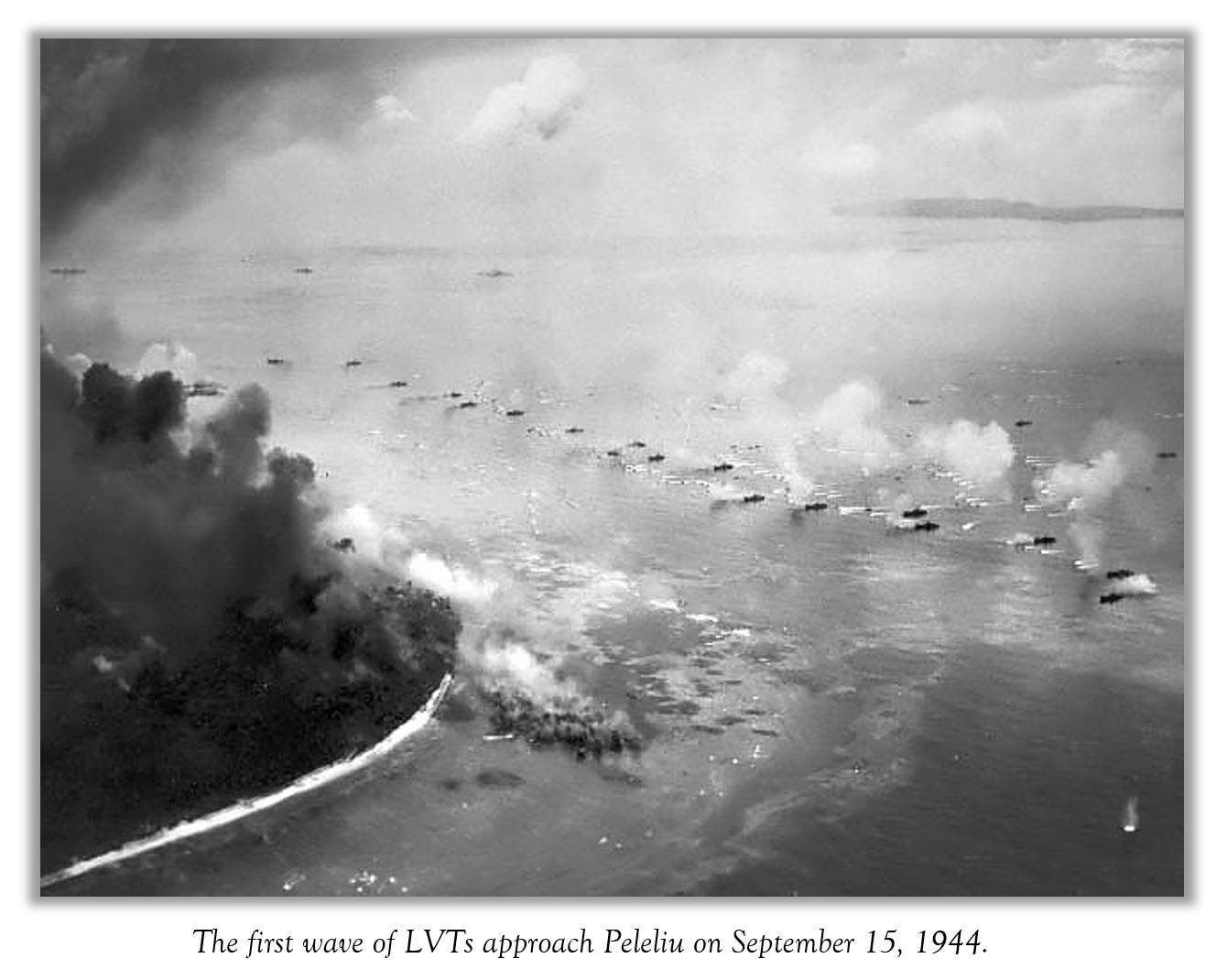TDIH: Battle of Peleliu
"Nowhere was the fighting efficiency of the U.S. Marine more convincingly demonstrated.”
On this day in 1944, Marines continue a costly battle on the island of Peleliu. American officers had expected a relatively easy victory, achieved in just a few days. Instead, the Battle of Peleliu dragged on for more than two months.
“Many factors combined to make the assault on Peleliu one of the least understood operations of World War II,” Marine Commandant Clifton B. Cates concludes. “Yet it was one of the most vicious and stubbornly contested, and nowhere was the fighting efficiency of the U.S. Marine more convincingly demonstrated.”
Peleliu differed from earlier Pacific battles: There would be no suicidal banzai charges. Instead, the Japanese hid in a series of intricate caves and tunnels, shooting from concealed positions and waging a war of attrition.
Many of these caves were on a particularly rough side of the island where a compact group of mountains, valleys, and ridges—the Umurbrogol massif—hid many of the Japanese. It would come to be known as “Bloody Nose Ridge.”
The 1st Marines’ amphibious assault came on September 15, 1944. American planners believed that the island had been softened up by days of aerial and naval bombardment, but they were mistaken. The Japanese had ridden out these attacks, safely ensconced underground.
Thus, they were ready for the American attack.
One Navy corpsman couldn’t believe his eyes. “We waded ashore,” John Hayes described, “but we couldn’t get off of the beach. . . . I was in the fourth wave and the other three waves were stuck on the fifty yards of beach. . . . And the bodies were just floating in the surf. And it was a real bloodbath.”
“[T]he beaches were littered with the dead and the stench was unbearable,” Marine Corporal Raymond Kaquatosh agreed. “It made you wretch with every breath you took.”
Our Marines were making progress, but it was slow, torturous work. They weren’t only fighting the Japanese but also unrelenting heat, sleep deprivation, and water shortages.
TIME correspondent Robert Martin described what he saw: “Peleliu is a horrible place . . . . incomparably worse than Guam in its bloodiness, terror, climate and the incomprehensible tenacity of the Japs. For sheer brutality and fatigue, I think it surpasses anything yet seen in the Pacific . . . .”
“These American kids are incredible,” he concluded.
The southern side of the island was finally secured after about a week, and our Marines turned their attention to the Umurbrogol. Officers hoped that one big push would secure the massif.
Unfortunately, the effort to secure Bloody Ridge was, if anything, even worse.
“Fanatical Japanese defenders had to be routed out,” the National WWII Museum explains, “hole by hole and cave by cave, with the enemy conducting nighttime infiltration raids into the American lines.”
The Japanese were being pushed into an ever-shrinking perimeter, but they fought for every inch, and the Marines were taking too many casualties. “What had once been companies in the 1st Marines,” one Marine observed, “looked like platoons” and “platoons looked like squads.”
Reinforcements arrived in the form of an Army regimental combat team, and, fortunately, even more assistance came when the island’s airfield became operational.
Bit by bit, our boys seized control. Japanese Colonel Kunio Nakagawa radioed his final report home on November 24, with less than 100 of his men remaining: “Our sword is broken and we have run out of spears.” It’s believed that he committed ritual suicide. The island was finally declared secure on November 27.
Fleet Admiral Chester Nimitz famously said that “uncommon valor was a common virtue” among those who fought at Iwo Jima. The same could be said of those at Peleliu, don’t you think?
Sources can always be found on my website, here.



Great summary of a truely horrible battle. If anyone wants to learn more I highly recommend "With The Old Breed" by E.B. Sledge. He was a private in the action and his book was very respected by the men who fought there. Thanks Tara.
War is truly hell on earth. Those Marines were unbelievable and it wasn’t just bullets that won the war. It was the fighting spirit and tenacity of the U.S. serviceman. Thank you to our service people around the globe, then, and now.